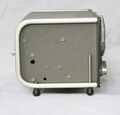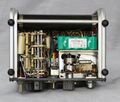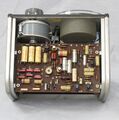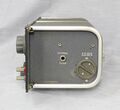1232-A: Difference between revisions
(→Links) |
No edit summary |
||
| (12 intermediate revisions by 2 users not shown) | |||
| Line 1: | Line 1: | ||
{{GR Product | {{GR Product | ||
|model=1232-A | |model=1232-A | ||
|class=detectors | |codes=VOCAL,1232-9701 | ||
|summary= | |class=amplifiers and detectors | ||
|summary=Tuned amplifier and null detector | |||
|image=GR 1232-A Front.jpg | |image=GR 1232-A Front.jpg | ||
|caption=General Radio 1232-A Tuned Amplifier and Null Detector | |caption=General Radio 1232-A Tuned Amplifier and Null Detector | ||
| Line 8: | Line 9: | ||
|introduced=1961 | |introduced=1961 | ||
|discontinued=1978+ | |discontinued=1978+ | ||
|designers=Albert E. Sanderson | |designers=Albert E. Sanderson, Henry P. Hall | ||
|manuals= | |manuals= | ||
* [[Media:GR 1232A Tuned Amp and Detector 1232-0100-C 08_1963.pdf|General Radio 1232-A Tuned Amplifier and Null Detector 1232-0100-C 08_1963]] | * [[Media:GR 1232A Tuned Amp and Detector 1232-0100-C 08_1963.pdf|General Radio 1232-A Tuned Amplifier and Null Detector 1232-0100-C 08_1963]] | ||
* [[Media:GR 1232-A Detector_Amp 1232-0100-00 12_1988.pdf|General Radio 1232-A Tuned Amplifier and Null Detector 1232-0100-00 12_1988]] | * [[Media:GR 1232-A Detector_Amp 1232-0100-00 12_1988.pdf|General Radio 1232-A Tuned Amplifier and Null Detector 1232-0100-00 12_1988]] | ||
{{Catalog History}} | |||
}} | }} | ||
The | The {{Title|General Radio 1232-A Tuned Amplifier and Null Detector}} was introduced in {{Catalog Q}} and remained available through {{Catalog 1978}}. | ||
The | The 1232-A is a solid-state, battery-operated tuned amplifier and null detector. Its tuned frequency range covers 20 to 20 kHz in 5 bands, plus a flat response setting. | ||
As a null detector, the 1232-A is part of the GR [[1240-A|1240-A Bridge Oscillator-Detector]], the [[1660-A|1660-A Inductance Measurement System]], and the [[1620-A|1620-A Capacitance Measurement System]]. Battery operation is provided by nine M72 cells (now obsolete). | |||
The instrument shown in the photos below has been converted to a rechargeable battery pack. | |||
(Instructions for this conversion are covered in a document below.) | |||
==Specifications== | ==Specifications== | ||
* '''Frequency Response:''' | * '''Frequency Response:''' | ||
* Tunable Filters: 20 Hz to 20 kHz in 3 ranges; 5% bandwidth; 2nd harmonic at least 34 dB down from peak, 3rd at least 40 dB down | * Tunable Filters: 20 Hz to 20 kHz in 3 ranges; 5% bandwidth; 2nd harmonic at least 34 dB down from peak, 3rd at least 40 dB down | ||
* 50 kHz and 100 kHz Filters: 2nd harmonic 44 and 53 dB down, respectively | * 50 kHz and 100 kHz Filters: 2nd harmonic 44 and 53 dB down, respectively | ||
* Flat Response: | * Flat Response: ±3 dB from 20 Hz to 100 kHz | ||
* '''Input Impedance:''' Approximately 50 kΩ at maximum gain, varies inversely with gain to 1 MΩ at minimum gain | * '''Input Impedance:''' Approximately 50 kΩ at maximum gain, varies inversely with gain to 1 MΩ at minimum gain | ||
* '''Gain:''' 120 dB on the tunable ranges; 100 dB, flat range; 106 dB at 50 kHz; 100 dB at l00 kHz position | * '''Gain:''' 120 dB on the tunable ranges; 100 dB, flat range; 106 dB at 50 kHz; 100 dB at l00 kHz position | ||
==Links== | ==Links== | ||
* [[Media:GR Exp 1232-A 07_1961.pdf|Experimenter describing Type 1232-A | * [[Media:GR Exp 1232-A 07_1961.pdf|Experimenter July 1961 describing Type 1232-A]] | ||
* [[Media:GR Exp 1232-P2 Preamplifier 02_1967.pdf|Experimenter describing 1232-P2 Preamplifier | * [[Media:GR Exp 1232-P2 Preamplifier 02_1967.pdf|Experimenter February 1967 describing 1232-P2 Preamplifier]] | ||
* [[Media:GR 1232-A Detector_Amp Battery Conversion| GR 1232-A Battery Conversion]] | * [[Media:GR 1232-A Detector_Amp Battery Conversion.pdf| GR 1232-A Battery Conversion]] | ||
==Photos== | ==Photos== | ||
| Line 42: | Line 48: | ||
GR 1232-A Right Side.jpg | GR 1232-A Right Side.jpg | ||
GR 1232-A Rear.jpg | GR 1232-A Rear.jpg | ||
GR 1240-A Close-Up.jpg | Late model, white front-panel 1232-A as part of a 1240-A | |||
</gallery> | </gallery> | ||
[[Category:Detectors Amplifiers]] | [[Category:Detectors Amplifiers]] | ||
Latest revision as of 15:25, 12 September 2024
The General Radio 1232-A Tuned Amplifier and Null Detector was introduced in Catalog Q (1961) and remained available through Catalog 1978.
The 1232-A is a solid-state, battery-operated tuned amplifier and null detector. Its tuned frequency range covers 20 to 20 kHz in 5 bands, plus a flat response setting.
As a null detector, the 1232-A is part of the GR 1240-A Bridge Oscillator-Detector, the 1660-A Inductance Measurement System, and the 1620-A Capacitance Measurement System. Battery operation is provided by nine M72 cells (now obsolete).
The instrument shown in the photos below has been converted to a rechargeable battery pack. (Instructions for this conversion are covered in a document below.)
Specifications
- Frequency Response:
- Tunable Filters: 20 Hz to 20 kHz in 3 ranges; 5% bandwidth; 2nd harmonic at least 34 dB down from peak, 3rd at least 40 dB down
- 50 kHz and 100 kHz Filters: 2nd harmonic 44 and 53 dB down, respectively
- Flat Response: ±3 dB from 20 Hz to 100 kHz
- Input Impedance: Approximately 50 kΩ at maximum gain, varies inversely with gain to 1 MΩ at minimum gain
- Gain: 120 dB on the tunable ranges; 100 dB, flat range; 106 dB at 50 kHz; 100 dB at l00 kHz position
Links
- Experimenter July 1961 describing Type 1232-A
- Experimenter February 1967 describing 1232-P2 Preamplifier
- GR 1232-A Battery Conversion
Photos
-
-
-
-
-
-
-
-
Late model, white front-panel 1232-A as part of a 1240-A







